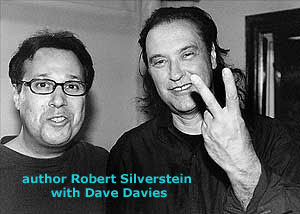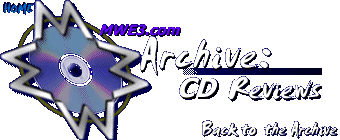 conducted by Robert Silverstein for mwe3.com |
|
|
|
Part 2 Robert Silverstein:
RS RS: For me, the Think Visual songs "How Are You", "Working At The Factory" and "Lost And Found" are some of my all-time favorite Kinks songs. And the two classic songs you wrote and sang for Think Visual—"Rock And Roll Cities" and "When You Were A Child" make it one of the most melodic and balanced Kinks albums ever. What are the sentiments behind the song classic "When You Were A Child"? DD: Where I was kinda coming from with that song is really related to the character in Bug if you like. (at this point, the C-60 tape runs out and our intrepid reviewer interrupts Dave and flips it over) Yeah, it’s an ongoing thing with me. It’s a valid question...all those lines of unanswered questions, still. When are we really going to believe that kindness and empathy...all these things are actually of more value than saving money in the bank. When we will ever realize that all the things we got inside us already are of greater value than all the property that we own and all the cars. It’s all the same things I’m saying today. "When You Were A Child" is about...wasn’t there a time?...there was a time for all of us when we lived in the now as kids, and we just did some things and we didn’t worry about time and time didn’t exist. Maybe it doesn’t really exist—enclosed in this place where everything was light and enjoyable and fun and different and exciting. Maybe that’s what it’s supposed to be like when you grow up. Maybe that’s better...a better version of that. Maybe that’s what striving towards a higher consciousness is. RS: Looking back on Think Visual, the only downside was the way MCA sort of dropped the ball after the album came out. Didn’t Irving Azoff sign The Kinks?
RS: For me, Think Visual was really a high point of many great Kinks’ ‘80s albums. DD: I think it’s a great record and it was under promoted. I went to MCA, with Ray, to do promotion in Los Angeles and I couldn’t get anyone to look me in the eye. They would not look me in the eye. RS: Being that it’s one of my favorite Kinks albums, I’d like to see it properly reissued. DD: I’m not sure what the actual contractual position is, but I think that we have it back. We’ve got most of our stuff back anyway. RS: I was reading the book Urban Spacemen & Wayfaring Strangers (Miller Freeman Books- www.books.mfi.com ), the Shel Talmy interview chapter, where Shel said that he wished he had a dollar for everyone who asked him if it was you or Jimmy Page who played the solo in "You Really Got Me". (laughter) Do you still remember recording the "You Really Got Me" session with early Kinks producer Shel Talmy? DD: Well, the first time we did it, Shel didn’t have a clue how to record it. His hero was Phil Spector. You know he came from that school. Shel did this really horrible version of it—not intentionally, just because he thought it should have gone one way, but we didn’t want it to go that way—like with lots of echo and stuff on it. So we had to pay—Robert Wace, our manager paid for us to go in the studio to record it exactly how we wanted it recorded, which was just a very dry, gritty sound, which is what we sounded like. We didn’t want all the trimmings of echoes and everything else. And I created that sound in my Mum’s front room and I played the solo on it. Yeah, Jimmy Page was around, he was on the scene. He was always looking to get in on the act. He was probably quite envious of what we were doing—I mean alot of people were. Even The Beatles were very, kind of—not spying on us—but like really interested in finding out what we were up to. Which was the way it kinda was then. RS: So that was the famous Harmony Meteor guitar you played on "You Really Got Me"?
RS: And Jimmy Page played rhythm guitar? DD: He played on a track—there was a track called "So Mystifying" on our first album. And then he played...Yeah, I mean he was a nice guy. He was so eager to get into the music business. He played on a couple of rhythm tracks on the album...what was that...the very first album. Then we started to get into recording alot more. Although Shel helped us a great deal, he was doing less and less and less work. RS: Also in the book, Shel said he’d really admired Ray’s songs. So Talmy was not as big an influence on the early Kinks sound as people think? DD: I think that the important thing with Shel was his belief. He walked in the room and you knew he was excited about what we were gonna do and he believed in it. Maybe that’s all it takes sometimes. He made some great records with us. It was collaborative, but I think as we grew to understand the technology and what was needed in the studio we kind of learned very quickly how to kind of pick Shel’s brains and the engineer’s brains and grew apart, not for any bad reason, just because we were learning more. RS: Shel Talmy also claims to have created the early Who sound and recently sold the rights to the first Who album for a huge sum. DD: Yeah, I heard that he was recording in L.A. But the thing is, that was probably very true with The Who, but it certainly wasn’t with The Kinks, because we hated the version that he did of "You Really Got Me". We recorded it the way we wanted it done. But we realized the importance and value of Shel is that extra person with perspective, that’s outside of the band that sometimes you need, ‘maybe do it like that, or what about this?’ So he did fit in as a very important ‘cook’—but it was after. Because if you listen to "All Day And All Of The Night"—I think sonically it’s a much better record. It’s a much more aggressive record than "You Really Got Me" and the reason why is because they said just do it how you really want to do it. Because we’d had success. We just went in and said ‘right, we’ll just do it how we want to do it’. I’d say, so ‘stick the mic up your ass’, and they said, ‘oh yeah, okay, that’s fine’, whereas before "You Really Got Me" everybody was taking the piss out of me at shows sayin’, ‘that silly kid, what’s that silly noise he’s making?’ And after, everybody kept coming up to me saying, ‘how’d you do that?, how’d you do this? It’s amazing!’ (laughter) RS: Speaking of which...The Kinks and The Who were friends and musical rivals back in the ‘60s and I can’t remember if it was you or Ray that once said that after Pete Townshend found out that The Kinks were gonna write and record Arthur, Townshend turned around and got to work on Tommy. Do you recall that? DD: Well to be fair to Pete Townshend, who’s always been very honest about the big influence of Ray’s writing and The Kinks’ music...so bless him for that whereas alot of other people haven’t been quite as upfront. But he was a great lover of our music. I think what happened was that Ray and Pete had a mutual friend who was an artist—a guy called Barry Fantoni—who’s a musician. In actual fact, me and Ray made a record with him singing. I think it was just like, Barry was a friend of Ray’s and we’d be recording Arthur, and just socially he’d meet Pete and say what he’d been doing and (say), ‘Dave’s brother’s doing this great piece of work.’ I think it kinda happened like that. Because I always think, with no disrespect, ‘cause I’m a really, really big fan and a big admirer of Pete Townshend’s work and how he’s used his personality to drive his music. I have so much admiration for him. But, I think that Tommy—I mean it’s a great record, but the afterthought about it being a concept piece was kind of a bit so fragmented when you consider why I regard Arthur as probably the most important concept album of that period. Because it was very poignant politically in what as happening to England and the Empire—or so-called Empire—and people’s dreams. The middle classes were taking over. I thought it was a very powerful piece of work. But then again—our timing has always been shit. (laughter). RS: But then again, each Kinks album is like a masterpiece...they all stand together as a brilliant body of work. DD: Well that’s great, I’m glad you said that. That’s nice, thank you. It’s like a continuation of the story. RS: There were so many great U.K. bands during that first British invasion. I was 9 when I saw The Beatles on Ed Sullivan in February ‘64. It was hard to tell with so much going on at the time, but looking back on it all, you must still have fond memories of that era and the coming to America of The Beatles and The Stones and then The Kinks and The Who. DD: We got on probably well with The Who. We even did some shows together in the States, in Chicago, in the early ‘70s. So we used to hang out a bit, whereas with The Stones and The Beatles we only met them really briefly during that mid ‘60s period. It was great. It was all very exciting, the early times. I had a ball! I was just this working class kid that played a few chords on the guitar with a bit of an attitude. And all of a sudden I was on the front page of a magazine because I went into a ladies hat shop drunk and bought a silly hat just to annoy people and people thought it was a fashion statement! (laughter) It was funny. RS: Back in the ‘60s when I was a teenybopper, I think the first Kinks album that really totally caught my ear was the ‘66 Kink Kontroversy album. You must remember that one. DD: Of course I do! Yeah. I thought it was great record. But we made it really quickly. Crash, bang...Ray’s writing a melody in the morning, I put some riffs together and then get back together and it’d be done. Like it came out of the air. RS: Being that George Harrison recently left the material world, do you have any reflections on George? DD: I always felt—I don’t know but in the back of my mind I always kinda felt that George and I would bump into each other and record something. I think it’s just so sad that it never happened. And with Joey Ramone as well. We talked about writing some songs together—Joey and I. Of course it’s unbelievable... RS: Did George influence your guitar playing? DD: Not directly, although I was always such a great admirer of George Harrison’s playing. And actually I think he was really underrated as a guitar player, to be honest. Everybody was focusing so much on Eric Clapton, it was so boring. I mean, not him. Kinda putting it a bit out of context... RS: I know what you mean. DD: It was absolutely ridiculous. You know, with the greatest respect to Eric, I mean his blues playing is phenomenal. But he never really stretched out to try and do anything new, like Jeff Beck or George Harrison. He stayed where he was comfortable with his playing. Which is great, I mean, which is phenomenal. But whereas The Kinks and The Beatles—I think we were always experimenting with different kinds of sound and tone and tuning and trying to make ordinary instruments sound exotic, like sitar. So there was a lot of creativity and experimentation involved in The Beatles’ music—and our own. To a lesser extent, The Stones, but they were great anyway, in their own ways. RS: I was listening to "20th Century Man" from Muswell Hillbillies the other day, and I was thinking now that the song’s lyrics were so prophetic considering what’s going on today. "This is the age of machinery, mechanical nightmare, the wonderful age of technology, napalm, hydrogen bomb, biological warfare". DD: That’s one of my favorite records, Muswell Hillbillies. I’m a big fan as well y’know...(laughter). RS: Following up the last Kinks Reprise album, the highly polished Lola Vs. Powerman Lp, Muswell Hillbillies is certainly up there as being among The Kinks’ most iconoclastic albums. Any memories of shifting from Reprise to RCA and of the 1970-71 Muswell Hillbillies era in general?
RS: So going from Reprise to RCA... DD: Anyway...we did more or less what we liked. Ray was going through this wonderful writing transformation period. You see the thing is that Ray and I have always...when our backs have been up against the wall we’ve always kind of looked back and our family has always been a tremendous source...our musical influences and our family have always been the main source of inspiration. Looking back, our families are Muswell Hillbillies-like. Alot of the characters in there are real people. And we grew up with a great fondness for Hank Williams. I was a tremendous fan of Hank Williams. Ray and I kind of used to always play Country & Western songs and we used to sing Hank Williams songs as a duo, practicing, learning. And it was kind of like fondness for our past and fondness for our musical roots or inspirations. "Here Come The People In Gray" is one of my favorite tracks. RS: And you guys came from the Muswell Hill section in London. DD: Also, there was the thing about that they pulled down these lovely Victorian houses. All they needed to do was to refurbish them, put some money into them. What was it...Gandhi said that, ‘there’s nothing more violent than poverty’. Architecture in the ‘60s...early ‘60s...they used to pull all these lovely buildings down and build all these horrible, concrete future ghettos. RS: Some of my favorite Kinks tunes were recorded on the underrated 1991 Columbia EP called Didya? There was some great music on that particular EP, including your song "Look Through Any Doorway" which you later revived on the Dave Davies Rock Bottom Live Cd. Could you say something about "Look Through Any Doorway"? DD: That song kind of ties in to the "Displaced Persons" thing. It’s about a woman that I met on the street in London. In London—obviously the homelessness is even worse now. Anyway there was this one particular woman sitting in this doorway and she was a middle class woman. She had no home, she’d lost her family. And it seemed funny. I’d always thought, traditionally thought, that the homeless person was really homeless. They were really bums. But these were real people that’d just hit on really hard times and had nobody to help them. I just didn’t know what to do. You give them money and then three days later they don’t have any money. And what do you do? It’s horrible and then it just made me think about that you look through any doorway, it’s like looking into everybody’s eyes. We’ve all got a place of poverty, spiritual poverty within us and loneliness and isolation and spiritual hunger. It’s not always material things that can solve problems for us and that’s where I got the idea of that song. RS: The Didya? EP really impressed me even more than the one and only album The Kinks made for Columbia Records, Phobia. It seemed like after Didya? came out, and I know you like Phobia, but it seemed that some of the magic from the EP was missing on the Phobia album. I felt Columbia really disregarded The Kinks. DD: Yeah, they treated us really poorly and they should be ashamed. Too many people making too much money in executive positions not knowing what they’re doing. RS: You say you’re also a big Kinks fan. Call it intuition, but I feel that you still consider Village Green Preservation Society the best of the Kinks ‘60s albums. DD: Yeah, in a way but Arthur was more important to me. I think it’s a much more politically focused record I think, whereas Village Green is more nostalgic, it’s more reflective and more yearning. I always thought that Arthur—I thought that this was our new beginning. I thought that was going to be our new beginning into a new place musically and as artists. But I know what you mean about Village Green, it’s like really hard to ignore it—you can’t. RS: I always thought that Village Green, Arthur and the Lola Vs. Powerman albums were almost like a trilogy. DD: Yeah, one grew out of the other I think. RS: Even with the "music business" at an all-time low, with all the interest in The Kinks and all the ‘60s and ‘70s reissues, do you foresee a time when you’ll reunite with your brother Ray for a new Kinks album? DD: Well, the last year, Ray and I have been talking. We have been talking about trying to do something but we can’t agree on what to do. Because I think it’s a good time now. Maybe people won’t ignore what we’ve got to say anymore. I think that Ray and I together are a very powerful combination. It would be great to do something but we haven’t quite worked out exactly what it is yet. RS: You always wrote great songs for The Kinks. Ray was like the mentor of the band, but your songs and guitar work are brilliant too. DD: I always kind of like to think that Ray was the intellectual part of The Kinks and I was the spiritual, emotional part. I think that we’ve finally given each other pieces of each other that we both needed. RS: Do you think there’s any record companies left who have enough class to work with The Kinks? DD: Well they’d have to be pretty fearless, have alot of faith, hope and love (laughter). RS: Do you ever speak with the other two original Kinks—Mick Avory and Pete Quaife? DD: Yeah, I spoke to Pete a year ago. Mick’s around, I haven’t spoken for a year or two, but I know that Ray sees him regularly. They have a pint and play a bit of golf or whatever...Mick plays. RS: The Kinks didn’t record much instrumental music till Percy came out. Was there any interest in The Kinks playing instrumental music? Growing up were you into The Ventures and The Shadows? DD: Duane Eddy—I was a big fan of Duane Eddy. On "The LIE" on Bug, that’s kind of like a little private statement of mine on how innocent melody is. RS: The guitar on there sounds a bit Duane-ish.
RS: Were The Shadows a big influence. DD: Of course they were...growing up in that period. But, I never thought they were...I don’t know, gritty? The Ventures were more intense, their records sounded more intense, more rock and roll than The Shadows. The Shadows sounded a little bit kind of show-bizzy. Whereas The Ventures sounded more real—you know what I mean? RS: Growing up in the States, we didn’t get any Shadows music here. DD: You didn’t need to! You had Johnny & The Hurricanes, you had The Ventures. I mean what the hell more could you possibly want? (laughter) RS: The Kinks made some instrumental music on the Percy album. Is there a place for instrumental music with The Kinks? DD: It’s funny, people have asked me to make an instrumental record. I don’t know, maybe I’d like to but I kind of like songs. I don’t know, maybe that’s a good idea. RS: Well I guess I’ve got some good information for the article. DD: Alright, I look forward to it, you asked some really cool questions. Thanks for your emotion and input...very stimulating conversation!
|
||
|
Thanks to Koch
Records, Meta Music and
www.DaveDavies.com , Kate Bourbonn, Alfred Russell, Rafaela from the
Official Dave Davies Fan Club: ODDFC@aol.com and Dave Emlen of The Kinks
Web Site: http://kinks.it.rit.edu/
The Dave Davies live pictures taken at Downtown in Farmingdale, L.I. on 4/27 courtesy of Rich Cervone: Richard Cervone/ photo by Hollywood: email- richardcervone@rcn.com Recommended listening: |
For audio
samples you'll
|
|
|
|
||

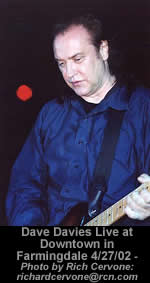
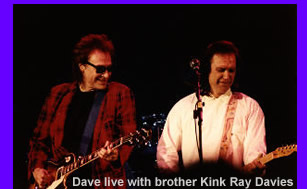 DD: Yeah, but he didn’t really have anything to do with it. They
thought they were signing an icon. They didn’t really work the album.
This is the reason why the music business is in such a shitty state
today. Because the people in it have fucked it up cause they don’t care
about music. They care more about their own egos and their jobs and five
bloody BMW’s and their own position in the company. And that’s what
happens in the aftermath of the greed and the too much money. The
million dollar deals they were doing had nothing to do with music. He
probably just said okay and pay ‘em the money and that was it. He
probably never heard it. (laughter).
DD: Yeah, but he didn’t really have anything to do with it. They
thought they were signing an icon. They didn’t really work the album.
This is the reason why the music business is in such a shitty state
today. Because the people in it have fucked it up cause they don’t care
about music. They care more about their own egos and their jobs and five
bloody BMW’s and their own position in the company. And that’s what
happens in the aftermath of the greed and the too much money. The
million dollar deals they were doing had nothing to do with music. He
probably just said okay and pay ‘em the money and that was it. He
probably never heard it. (laughter).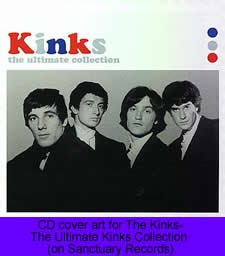 DD: The Harmony Meteor through my little green Elpico amp—worked up
the speaker with a razor blade (laughter).
DD: The Harmony Meteor through my little green Elpico amp—worked up
the speaker with a razor blade (laughter).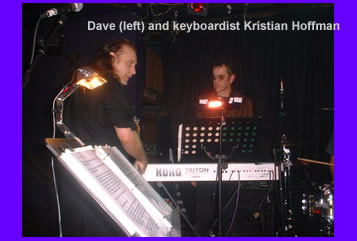 DD: RCA—when they were really great..there were some really great
people there. In actual fact, some years later, I went back to RCA (as a
solo artist) because they had really good music people. And they just
really let us do what we wanted to do. It’s like the thing about the
producer thing. Sometimes a producer and a record company—or in the old
days, the A&R guy—was somebody who cared about the music and the
performer. Now, A&R people are becoming extinct. It’s self-extinction
because they took their roles too seriously...self-importance in
changing people’s fucking music. The nurturing thing has gone out. These
people are supposed to be nurturers of artists and helpful and help them
to create, protect their work rather than taking all the credit and
changing it because they’ve got ego problems. (laughter)
DD: RCA—when they were really great..there were some really great
people there. In actual fact, some years later, I went back to RCA (as a
solo artist) because they had really good music people. And they just
really let us do what we wanted to do. It’s like the thing about the
producer thing. Sometimes a producer and a record company—or in the old
days, the A&R guy—was somebody who cared about the music and the
performer. Now, A&R people are becoming extinct. It’s self-extinction
because they took their roles too seriously...self-importance in
changing people’s fucking music. The nurturing thing has gone out. These
people are supposed to be nurturers of artists and helpful and help them
to create, protect their work rather than taking all the credit and
changing it because they’ve got ego problems. (laughter) 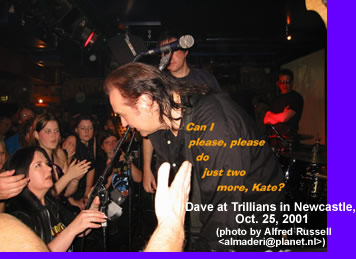 DD: It’s deliberate, because I was such a huge Duane Eddy fan. It was
all so innocent and fun and wonderful times.
DD: It’s deliberate, because I was such a huge Duane Eddy fan. It was
all so innocent and fun and wonderful times.